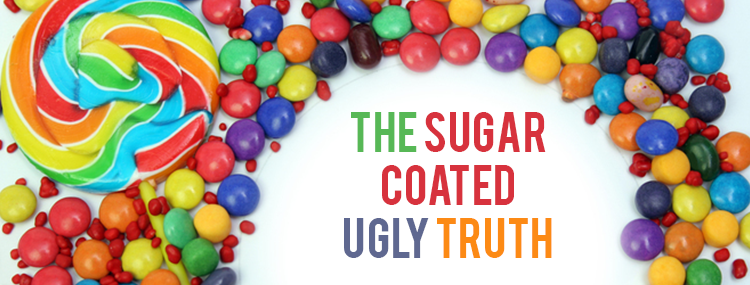
The Sugar Coated Ugly Truth
The longstanding love affair between sugar and the Indian palate is well known, and indeed with disastrous consequences! The sugar coated ugly truth, of course, is that sugar can be bad…in many ways.
Sugar is usually , at least for most of us, synonymous with the white table sugar that is used in sweets and beverages, but there is also sugar in foods we so enjoy eating (biscuits, preserves, jams, sweetened beverages and so on) where sugar is present in its different avatars.
Basically there are two kinds of sugars:
- a) Naturally occurring sugars – These sugars are naturally present as lactose in milk and fructose in fruits
- b) Added sugars – Added sugars are the sugars which are at the table or added to the foods or drinks during the processing or preparation. The amount of sugars in foods like cakes, cookies, soft drinks, candies, and fruit drinks, jams, jellies, candies, sugar boiled confectionaries, doughnuts, chocolates, biscuits and most baked products usually exceed safe levels.
We all do know that the table sugar, honey and jaggery contain sugar. But where else do we look for them, so that we are aware of the hidden dangers?
Some foods do not mention ‘sugars’ in their ingredient list but still have sugar present in them. They are labeled in a different way. There is no differentiation between natural sugars and hidden sugars on the label! If the first few ingredients are a form of sugars, then the food is likely to be high in total sugar.
The names which represent sugars in foods are –
- Brown sugar
- Corn syrup
- Fruit juice concentrates
- Corn sweetener
- Invert sugar
- Honey
- Malt
- High fructose corn syrup (HFCS)
Lactose, fructose, dextrose, sucrose, maltose, galactose, cane sugar, beet sugar, fruit syrup, raw sugar, confectioner’s sugar and molasses are other names for added sugar in foods. Many so called weight loss foods or diabetic foods have sweeteners (fructose, lactose or maltodextrin) added which can also be another form of sugar.
A very recent research paper published in the American College of Cardiology highlighted the fact that sugars in foods (in the form of sucrose or high fructose corn syrup or HFCS) increase the risk of developing chronic diseases such as diabetes, cardiovascular diseases besides leading to weight gain.
Health organizations worldwide believe more than 50 % of your calories in a day should come from “good carbs”. They also emphasize the need to limit high sugary, starchy foods that contain no other nutrients other than simple sugars. The trouble with such sugary treats is that they spike up blood glucose levels in a jiffy, and this over a period of time, leads to insulin resistance (which means although the body is producing large amounts of insulin to digest the sugars, the body develops resistance to insulin, which rises blood sugar levels). This is the first step towards developing diabetes.
How to cut down sugar in your diet?
- Avoid foods with added sugar. Read food labels carefully and identify hidden sources of sugars. You need to be more cautious if you are diabetic!
- Cut down the sugar you add to your hot beverages. Try to add a little cinnamon to the coffee or hot chocolate as it adds to the flavour.
- Choose cereals which are not coated with sugar or honey. Add a fruit to the cereals instead of sugar.
- Remove the white and brown sugar, molasses, and syrups from your table.
- Drink water instead of soft drinks and juices.
- Have fruits instead of packaged juices, cakes, cookies, biscuits, sweets.
- Cut down the sugar to half while cooking recipes or use natural fresh dates or banana to sweeten the desserts.
- Keep an eye on the nutrition labels of foods when buying. Pick foods with less added sugar or low sugar version.
- Add spices like nutmeg, cinnamon or ginger instead of sugar to recipes
- When you have a craving for sweetness, go out for a walk. Walking helps you in curbing the cravings.
Eating wholesome and balanced meals every day is your best insurance against chronic lifestyle diseases such as diabetes. Calorie Care offers professionally planned meals with the right amount of healthy carbs, so managing your health becomes easy! Order your healthy meals today at www.caloriecare.com.



